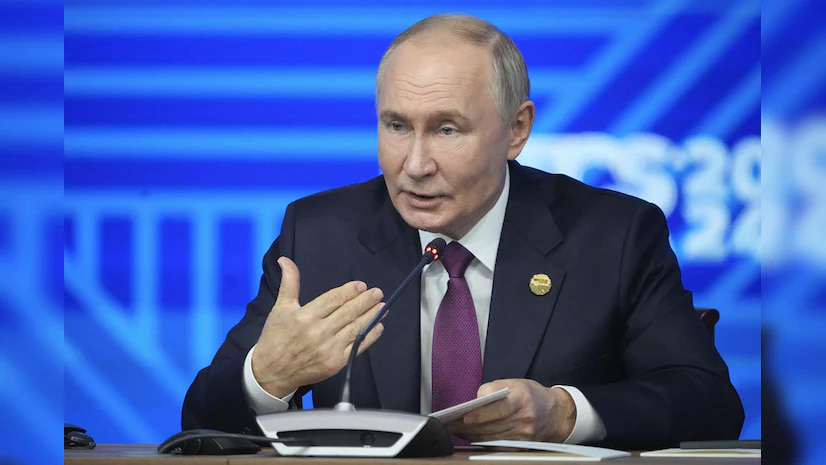Moscow: Russian President Vladimir Putin signed a decree expanding the circumstances under which Moscow could use nuclear weapons, including against non-nuclear states supported by nuclear powers. This bold move underscores a direct warning to the West amid the escalating conflict with Ukraine.

The decision comes as U.S. President Joe Biden allowed Ukraine to employ U.S.-built ATACMS missiles, marking a significant shift in American military policy. This provision has enabled Ukraine to strike deeper into Russian territory, a development coinciding with the 1,000th day of Russia’s invasion of Ukraine.
Adding to the geopolitical tension, this change precedes the upcoming transfer of power in Washington. Former President Donald Trump, who has expressed skepticism regarding extensive U.S. support for Ukraine, is set to take office shortly. This period of transition could dramatically influence the trajectory of the ongoing war and international responses.
Key Aspects of the Decree
Expanded Nuclear Use Cases: The decree allows nuclear retaliation not only against nuclear-armed adversaries but also against conventional military threats from non-nuclear states if supported by nuclear powers. This shift lowers the threshold for nuclear engagement, citing defense of sovereignty as the primary motive.
New Scenarios for Deployment: Conventional attacks by states allied with nuclear powers, including on Russian allies like Belarus. Massive violations of Russia’s borders using drones, missiles, or aircraft. Situations perceived as critically threatening Russia’s territorial integrity.
Defensive Justification: Putin emphasized that the policy remains defensive, aimed at maintaining strategic deterrence while ensuring Russia’s and its allies’ security.
Implications for Allies and Rivals: Belarus, closely allied with Moscow, is now explicitly included under Russia’s nuclear umbrella, raising alarms in neighboring NATO states and sparking international scrutiny.
Geopolitical Context
This decree follows heightened tensions after the U.S. permitted Ukraine to use American-made ballistic missiles against Russian territory. The Kremlin perceives this as Western-backed aggression. Putin’s decision aligns with Moscow’s longstanding narrative of safeguarding its sovereignty amidst external threats.
The timing of the decree highlights its symbolic significance, coinciding with the anniversary of the conflict, showcasing Russia’s resolve in the face of perceived Western hostility.
Global Reactions
NATO and the West: The U.S. and NATO have condemned the decree, viewing it as a destabilizing step in an already volatile conflict. Western leaders continue to urge diplomatic resolutions but remain wary of Russia’s intentions.
China and Neutral States: Some nations, including China, advocate caution, emphasizing the need to avoid nuclear escalation while respecting sovereignty.
Ukrainian Perspective: Kyiv labeled the move as “nuclear blackmail,” urging global powers to counteract Russian aggression with unified resistance.
Strategic Implications
Nuclear Brinkmanship: The lowered threshold for nuclear weapon use risks making tactical nuclear strikes more feasible, increasing the potential for miscalculation in conflicts.
Regional Instability: With Belarus included as a protected ally, bordering nations face heightened risks of escalated military activities.
Military Doctrine Shift: Russia’s emphasis on nuclear capability might redefine global norms on the use of such weapons.
This decree underscores the enduring complexity of nuclear diplomacy, particularly in conflicts entangled with global power dynamics. As the Russia-Ukraine war persists, maintaining channels for negotiation remains crucial to averting catastrophic outcomes.
Frequently Asked Questions
1. What does this decree mean for global security?
The decree increases the risk of nuclear engagement by lowering the bar for Russia’s use of nuclear weapons, potentially undermining global non-proliferation efforts.
2. How does this affect NATO?
NATO states may feel compelled to bolster their own deterrence capabilities, risking a renewed arms race in Europe.
3. Is Russia’s move unprecedented?
While nuclear doctrines evolve, explicitly tying non-nuclear state actions to potential nuclear responses represents a stark departure from prior international norms.
4. Does this signal an immediate threat?
While it escalates rhetoric, analysts believe it aims to deter rather than initiate nuclear conflict. However, its ambiguity raises concerns about potential misinterpretation.
5. How has the UN responded?
The UN Secretary-General has called for de-escalation, urging all nuclear-armed states to adhere to restraint and dialogue.
Reference : http://www.bbc.com





